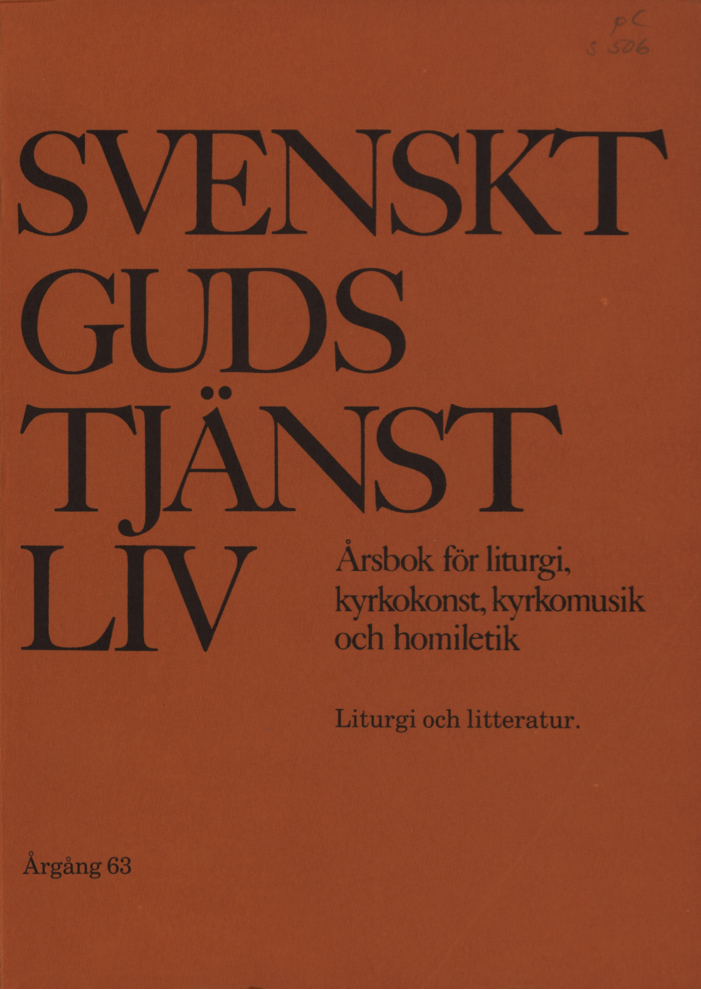The Word within the World. Liturgi och verklighet i Olov Hartmans "Innanför"
Abstract
Olov Hartman (1906-1982), theologian and author, has been in the centre of the Swedish theological and cultural debate for more than four decades. As director for the Sigtuna foundation (Sigtunastiftelsen) 1948-1971 he was a bridge-builder between culture/society and theology/church in a very broad sense. His literary production —he has been published in most genres —can be read as a continual dialogue with different theological, political, social and cultural groups.
In 1986, Hartman’s theological author ship was given a careful and illuminating analysis in a doctoral thesis by Claes-Bertil Ytterberg, “Olov Hartman och det kosmiska dramat” (English summary: “Olov Hartman and the Cosmic Drama”), published by Libris, Örebro. Ytterberg underlines the Lutheran character of Hartman’s theology: a pessimistic view of man as sinner, totally dependent on the grace of God. This, how ever, is combined with a highly original development of Christology in line with the kenotic tradition. The Almighty has for the sake of love become powerless and meets man in weakness, poverty and destitution —and the destituted God meets man in his destitution as a sinner, doubter and outsider recognizing the meaninglessness of human existence.
Thus, the incarnation and the passion drama is the dramatic meeting place where the destitution of God meets the destitution of man. This is above all realized in the sacramental presence of the incarnated Lord in the eucharist, in its turn leading to the discovery of His continual hidden presence in the whole world. Thus, the Lutheran view of sin and justification is combined with a strong liturgical and sacramental tendency.
The novel discussed in this article, “Innanför” (“Within”), most skilfully and artistically deals with persons in an existential crisis, experiencing themselves as outsiders in relation to the world, their fellow-creatures, themselves — and God. Hartman thus concretely illustrates, in the form of a novel, his view of human destitution, finally however leading to the salvific encounter with the destituted God incarnated in Christ and meeting man in liturgy and sacraments.
“The Word within the World”, forming the motto of the novel, is taken from a poem by T S Eliot (inspired, of course, by the Prologue to St John’s gospel). The gradual discovery of the truth of divine presence in the world forms the very theme of the novel, and the liturgy is put forth as the way to this discovery.
In a highly original way, the structure of the novel is built by letting the eight chapters correspond to the eight horae of the breviary (being in renewed use in many cirles within the church of Sweden to-day). The cosmic perspective opened up in matins and the light motive from lauds sound very hollow when they first are introduced. Nevertheless, after the darkness of the sixth hour and the violent substitute death taking place at the ninth hour, in the end of the novel their reality is finally experienced and acknowledged — not generally, but by the female central character of the book.
Downloads
Publicerad
Nummer
Sektion
Licens
© författarna, Laurentius Petri Sällskapet för svenskt gudstjänstliv samt Artos & Norma bokförlag. Det är tillåtet att kopiera och använda material ur Svenskt Gudstjänstliv för forskningsändamål om källan anges. För övriga ändamål kontakta respektive artikelförfattare samt förlaget. Särskilda restriktioner kan gälla för bildmaterial.


